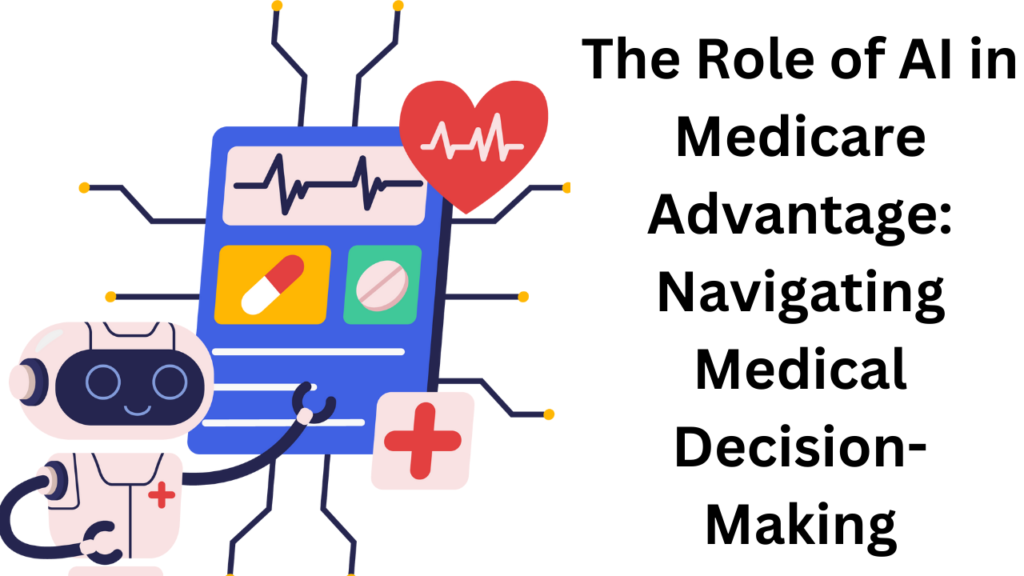The Role of AI in Medicare Advantage: Navigating Medical Decision-Making
As technology advances, artificial intelligence (AI) is increasingly being integrated into various aspects of healthcare, including in Medicare Advantage (MA) plans. AI’s deployment within these plans is reshaping how medical decisions are made, offering potential benefits such as increased efficiency and personalized medicine, but also raising significant ethical and practical concerns. This section explores how Medicare Advantage utilizes AI to make medical decisions for Medicare patients, detailing the benefits, challenges, and implications of this integration.

AI Integration in Medicare Advantage
AI in Medicare Advantage is primarily used to analyze large datasets to identify patterns, predict outcomes, and make recommendations. These capabilities are applied in several ways:
- Predictive Analytics: AI algorithms can predict patients’ future healthcare needs based on their medical histories and broader data trends. For instance, AI might analyze data from various patients to predict who is at risk of developing chronic conditions like diabetes or heart disease. This allows MA plans to proactively manage these patients through early intervention, potentially improving outcomes and reducing costs.
- Personalized Treatment Plans: AI can help tailor treatment plans to individual patients’ needs. By analyzing data from numerous sources, including electronic health records (EHRs), genetic information, and even continuous monitoring devices, AI can suggest customized treatment protocols that are more effective and efficient.
- Optimization of Resources: AI systems can optimize resource allocation by predicting high-demand periods or identifying which healthcare services will be most utilized. This can help MA plans manage their networks more efficiently, ensuring that patients receive care when needed without undue delay.
Benefits of AI in Medical Decision-Making
The use of AI in Medicare Advantage can lead to several potential benefits:
- Efficiency: AI can quickly process vast amounts of data, making it faster than traditional methods in identifying at-risk patients and suggesting interventions.
- Cost Reduction: By predicting which patients are at risk of expensive emergency treatments and intervening earlier, MA plans can potentially reduce the incidence of high-cost medical events.
- Improved Patient Outcomes: Early detection and personalized treatment plans facilitated by AI can lead to better health outcomes for patients.
Challenges and Ethical Concerns
However, the integration of AI in medical decision-making also presents challenges and ethical concerns:
- Privacy and Data Security: The use of AI requires access to large datasets of personal health information, raising concerns about data privacy and security.
- Bias and Inaccuracy: AI systems are only as good as the data they are trained on. If this data is biased or incomplete, the AI’s recommendations can be flawed, potentially leading to inappropriate care decisions.
- Transparency and Trust: There is often a lack of transparency in how AI algorithms make decisions. This can erode trust among patients and healthcare providers, who may feel uncomfortable relying on a “black box” for critical health decisions.
Real-World Implications
Consider a scenario where an AI system identifies a patient as high-risk for heart failure based on their health data. The system might recommend preventive measures such as medications or lifestyle changes. While potentially beneficial, if the AI’s prediction is based on biased data (e.g., underrepresenting certain demographics), it could lead to inappropriate or unnecessary treatments for some patients.
Moreover, reliance on AI can lead to situations where the human element of healthcare is diminished. Patients may feel treated like numbers rather than individuals, and doctors may feel pressured to follow AI recommendations even when their professional judgment suggests an alternative approach.
The use of AI in Medicare Advantage is a double-edged sword. While it offers the promise of improved efficiency, cost savings, and enhanced patient outcomes, it also introduces significant challenges that need to be carefully managed. Ensuring the ethical use of AI, safeguarding patient data, and maintaining transparency in decision-making processes are critical to harnessing the benefits of AI in Medicare Advantage without compromising the quality of care or patient trust. As MA plans continue to integrate AI, continuous evaluation and regulation will be essential to address these concerns effectively.




